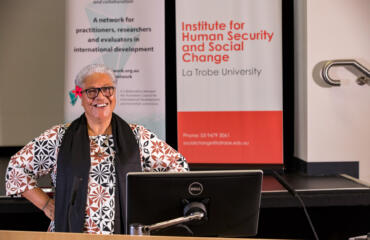
Mr Trump’s election the “only way to stop the trade catastrophe”, according to the President-elect. PIC: Joseph Sohm
The Trans-Pacific Partnership
The controversialtrade deal is yet to secure Congressional approval. While serving as Secretary of State, Hillary Clinton had praised the TPP as a deal that “sets the gold standard in trade agreements”, a view that she had come to modify by the time Americans went to the polls this week, having cited concerns about patent rights for pharmaceutical companies and currency manipulation. “I oppose TPP now, I’ll oppose it after the election,” she had declared.
Mr Trump had assured Americans that him winning was the “only way to stop the trade catastrophe.” In a speech, Declaring America’s Economic Indepenence, he went further. He claimed that TPP would be the death blow for American manufacturing and vowed to cancel the pending trade deal, a US-initiated economic pact with 11 other Asia-Pacific countries, including Washington allies such as Australia.
“TPP is likely dead on arrival in the immediate future, though it is less clear if Trump would delivery on his threat of tariffs on Chinese imports that could trigger a trade war,” Dr Elvin Lim, of the National University of Singapore, told The Citizen in an initial reaction to Donald Trump’s victory. President-elect Trump has also pledged to impose a 45 per cent tariff on Chinese imports.
Regardless of the rhetoric, according to the Australian Strategic Policy Institute, enhancing trade links with partners in the Asia-Pacific will be a priority for the next president. According to a report by the Organisation for Economic Co-operation and Development, the global middle class will expand from 1.8 billion in 2009 to 3.2 billion by 2020, with most of this growth occurring in Asia.
Backing the TPP, the US Chamber of Commerce said that trade could play an important role in restoring US economic growth. Today, more than 41 million American jobs depend on foreign trade. The US ran a cumulative trade surplus with its trade agreement partner countries of more than $US280 billion over the past eight years.

The economic consequences of failing to secure the benefits of integration with the world’s fastest growing region could prove costly not only for the US, but also its partners. Singapore’s Prime Minister, Hsien Loong, has said: “If you don’t finish TPP, you are giving the game away [to China].”
Deborah Elms, a Singapore-based economic analyst agreed. She told The Citizen that without the agreement, American engagement in the region would be limited to political and military ties. The executive director of the Asian Trade Centre added that strong economic links with the region were vital to ensuring future trade progress.
“If the US doesn’t stand by partners that have made significant investments in agreements like the TPP, how can it be viewed as a credible partner in the future?” she asked. In a 2015 speech in Arizona, US Secretary of Defence Ashton Carter described the trade agreement as effectively a “second aircraft carrier” to help underscore the US rebalancing strategy in the region.
“It would deepen alliances, underscore our lasting commitment to the Asia Pacific, and help us promote a global order that reflects both our interests and values,” he said. His remarks were seconded by Republican Senator and former presidential candidate John McCain. In a recent lecture on US policy in Asia, he said: “If TPP fails, American leadership in the Asia-Pacific may very well fail with it.”
Ebb and flow in the South China Sea
Despite The Hague ruling on territorial rights, which gave a ‘moral victory’ to the Philippines in the South China Sea dispute, competing claims will remain a major diplomatic struggle for the region.
In the landmark decision, an international tribunal ruled that China had no legal basis to claim “historical rights” to almost 90 per cent of the South China Sea, based on an old map made up of nine dotted lines published by the former Kuomintang Government in 1947.
The US had backed Manila’s case on the grounds that China’s claims were a threat to freedom of navigation and international law. China has since vehemently rejected the decision amid calls from regional players, including Australia, for the dispute to be resolved peacefully. Researchers at the Lowy Institute, a Sydney-based research outfit, have argued that China’s assertive move will be a long-term strategic challenge to the regional order.
“All signs point to a more isolationist, protectionist stance and a power vacuum that China would move to fill. Much depends on whether the foreign policy establishment in Washington wins the coming debate with the isolationists in the Trump camp.” — Elvin Lim, associate professor, National University of Singapore
Although Washington has reiterated that it has no intentions of stirring tensions, the US Navy has been increasing patrols in one of the world’s busiest trade routes. According to Robert D Kaplan, a former member of the Pentagon’s Defence Policy Board, the “muscle flexing” between warships of different nations creates a risk of armed conflict in the region.
However, he said the withdrawal of even one US aircraft carrier from the Western Pacific would be a “game changer”. Similarly, the Washington-based Brookings Institution noted in a recent report the “manner in which the United States deals with China will be a critical, if not the critical, overseas challenge for the United States in the 21st century.”
In her 2014 memoir Hard Choices, Hillary Clinton wrote that the US-China relationship was not one that “fits neatly into categories like friend or rival.” It is a challenge that Mr Trump, the 45th US president, will have to carefully negotiate, with US domestic expectations that he will need to be more assertive and apply greater pressure on Beijing.
North Korea’s nuclear development was another hardly contested issue on the campaign trail, after Pyongyang conducted its fifth and most powerful nuclear test last September. The blast was in defiance of UN sanctions that were tightened in March. In recent years, the US has pursued a variety of policy responses to proliferation challenges, including military co-operation with allies in the region and wide-ranging sanctions.
According to the Hudson Institute, a Washington-based research group, a “turbulent future” with the totalitarian regime is almost a given. “North Korea will remain as a critical security challenge for the next president,” the institute’s researchers concluded.
ASEAN and human rights
ASEAN is one of the biggest markets for US exports, supporting hundreds of thousands of American jobs. As the first US President to meet with the leaders of all 10 ASEAN countries, Barack Obama managed to establish a personal connection and a strategic partnership with a hugely diverse region of more than 600 million people.
However, critics have argued that the Obama administration conveniently “downplayed” the human rights misgivings in the region. In February, in the lead up to the US-ASEAN summit in California, more than 100 parliamentarians from across the region called on President Obama to prioritise human rights concerns.
“While we recognise and understand your administration’s desire to strengthen trade and security co-operation with Southeast Asian governments, human rights, democracy and basic dignity cannot take a back seat to economic or security prerogatives,” their letter read.
An imminent challenge to regional leaders and the US is looming in the form of next year’s ASEAN chair, the Philippines. In accepting the role at the Laos summit, President Duterte said: “The Philippines is ready and willing to guide the regional grouping.”
But international rights watchdogs have been forceful in pointing out that President Duterte’s first 100 days in office have been marked by state-sanctioned violence on a shocking scale, dovetailing with a so-called “war on drugs” that has seen more than 3000 people killed.
“His brutal crackdown on those allegedly involved in drug crimes has led to carnage on the streets and the obliteration of key human rights, including the right to life and to due process,” said Rafendi Djamin, Amnesty International’s director of Southeast Asia and the Pacific.
“While we recognise and understand your administration’s desire to strengthen trade and security co-operation with Southeast Asian governments, human rights, democracy and basic dignity cannot take a back seat to economic or security prerogatives.” — extract from a letter to President Obama from regional parliamentarians
According to Dr Nymia Pimentel Simbulan, the executive director of the Philippines’ Human Rights Information Centre, human rights have not registered on the President’s agenda since coming to power. “Duterte has been very consistent about one thing: human rights have never been his concern,” she told The Citizen.
The next US president will have to step cautiously in dealing with the region’s spotty human rights record. A recent Amnesty International report concluded that the overall human rights picture has been worsening due to impunity (often for violations committed by security forces), violence against women, crackdowns on freedom of expression and undue pressure on civil society.
Late last year, the US-based watchdog Freedom House rated Thailand, Myanmar, Laos, Cambodia, Vietnam and Brunei as “not free” due to systemic violations of civil and political liberties; while the Philippines, Malaysia, Indonesia and Singapore were categorised as “partly free” due to several restrictions on the rights of their citizens.
According to Charles Santiago, the chairperson of ASEAN Parliamentarians for Human Rights, the region’s ‘report card’ paints a gloomy picture. “If ASEAN wants to be taken seriously, the grandiose talk must change. The talk must focus on democracy, human rights and upholding the rule of law,” he told The Citizen.
The ‘pivot to Asia’ legacy
As Barack Obama prepares to leave office, his foreign policy legacy — the so-called ‘pivot to Asia’, known more formally as the “US rebalance to Asia Pacific” – is increasingly under scrutiny.
Amid smoldering anxieties in the region, President Obama made his farewell trip to Asia in September in a last bid to reassure regional allies that Washington would remain committed to a long term agenda that includes expanding economic ties and maintaining a political even keel in the region.
At a news conference following an address to Southeast Asian leaders in Hanoi, the president hailed the “extraordinary progress” being made across the region and expressed confidence that his successor would continue the strategic ‘pivot’, which is about refocusing US attention on its role in the Asia-Pacific.
“My hope and expectation is that my successor will, in fact, sustain this kind of engagement, because there is a lot happening here. This is where the action is going to be when it comes to commerce, trade and, ultimately, creating US jobs by being able to sell to this market,” Mr Obama said.
According to Joshua Kurlantzick, an analyst at a New York-based think tank, sustaining the policy will be a challenge for the White House newcomer considering the regional pushbacks from China and the unsettling rhetoric of President Duterte.
“Although it is unclear how far he will go, Duterte’s actions are clearly altering the foreign policy, at least to some extent,” the senior fellow for Southeast Asia at the Council of Foreign Relations told The Citizen.
Dr Denny Roy, a security specialist at the US-based East-West Centre, questioned the appeal of Duterte’s approach. “Of course, if all the countries in Asia chose this course and the United States no longer had any regional security partners, the re-balance would collapse,” he said.

“However, it is very questionable how much appeal the Duterte approach will have in other Asian capitals,” he added. Despite infamously declaring his “separation” from the US at a Beijing meeting, President Duterte then explained that he was not severing ties with the Philippines’ long-time ally at all, but merely pursuing a more “independent foreign policy” by strengthening relations with China.
Last August, in an open letter, US-based Asia experts who served in past Republican administrations, argued that should Donald Trump get the chance to put his “nostrums” into practice, Asian countries would be forced to shift towards states challenging the US, most notably China.
The former senior officials, including Michael Green, who served as President George W Bush’s top Asia adviser at the White House, warned that it was wrong time to elect an “unstable, ill-prepared amateur” with no vision to meet the challenges of the 21st century in the region. Mr Trump responded by deriding the signatories as members of “the failed Washington elite” who “deserve the blame for making the world such a dangerous place.”
With Mr Trump’s political ascendancy, according to Dr Lim, of the National University of Singapore, all bets are off on the US pivot to Asia. The associate professor said that looming in tandem with Mr Trump’s election are China’s prospects of becoming a credible regional hegemon in Asia. He added that new friendships and unlikely alliances were likely to emerge in the Asia-Pacific should a US pull-back leave a political vacuum.
“All signs point to a more isolationist, protectionist stance and a power vacuum that China would move to fill,” he cautioned. “Much depends on whether the foreign policy establishment in Washington wins the coming debate with the isolationists in the Trump camp.”



